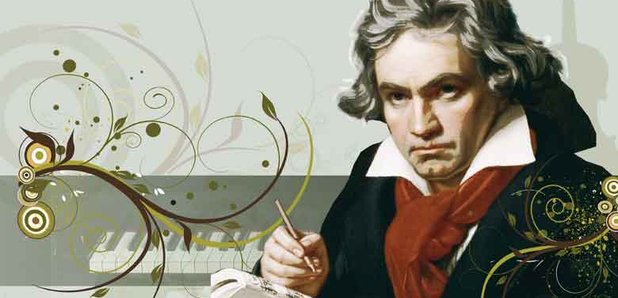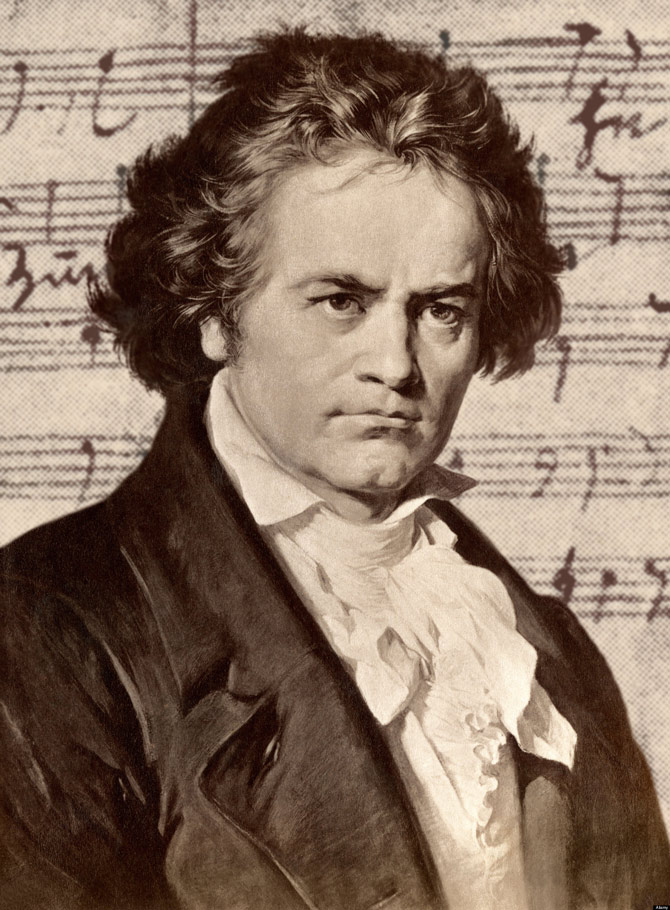Beethoven whose full name is Ludwig van Beethoven (December 17, 1770 – March 26, 1827) is a German classical composer. Most of the time he lived in Vienna, Austria. He was an important musical figure in the period of transition from classical to romantic music.
Like history, human culture has passed through many periods, including the Renaissance culture which is the most golden period in human culture.
Affordable time during which our solar system went into “spring orbit” in the galaxy, which created great inspiration for people in the creation of literature, painting and sculpture, music. .. And reached its peak, which still remains today. During this period, Beethoven and the genius composers Bach, Mozart, Liszt, Chopin, Schubert … left an enormous volume for humanity, including many musical genres.

Ludwig van Beethoven was born on December 16 (or 17) 1770 in the small village of Rajna near Bonn (Germany) in a poor family with musical traditions. Grandfather – Louis van Beethoven, the conductor of the court of Bonn. Father – Johann van Beethoven ruled the court of Bonn After 3 years of marriage with Maria Magdalena Keverich, Beethoven was born. Beethoven’s family has 7 brothers, but poverty and disease took away four younger brothers.
When he was only 8 years old, Beethoven demonstrated his musical prodigy – playing the piano. At the age of 14 he successfully wrote and performed 3 piano sonatas. In 1787 (17 years old) went to Vienn (Austria) – the musical capital of the world at that time to hope to learn from his teacher Mozart. Sadly, less than 3 weeks have to return to Bonn to mourn a gentle, calm, gentle and loving mother. The trauma of this loss greatly affected Beethoven’s later career in writing. In 1792 (age 22), Beethoven once again left his place where his hibiscus is buried to live and work in Vienna, but this time his teacher Mozart is no longer there.
As Goethe – the great German poet wrote: “Beethoven’s whole life was like a day full of storms”. At 31, Giulietta Guiccicand proposes to Count Gallenderg; Giulietta Guiccicand was Beethoven’s first love, with the most beautiful and passionate love. Under 35 in Vienna, more than 30 times have moved due to need. God was cruel and cruel to Beethoven, the musician’s most precious ears were also removed, in 1819, completely deaf in both ears. In 1823 began to suffer from blindness and gout, 1825 cirrhosis, in 1826 pneumonia and systemic edema. That same year, Beethoven had to undergo four painful operations. After a long illness, 6 hours and 45 minutes on March 26, 1827, breathed his last without a word. Three days later, tens of thousands of friends, colleagues, music admirers … among which the genius musician Schubert and the talented female artist AnschÓTZ brought Beethoven to the Wahringer cemetery in Vienn. Only 61 years later (1888) the remains of Beethoven were brought back to the solemn place of the Zentral cemetery, Vienn with a single grave, no words, only one word: “Beethoven”.

Beethoven’s life is not long, 57 years from birth to deprivation in all aspects, heavy emotional and physical damage. But in this genius musician there is an extraordinary energy that surpassed everything to overcome his bitter and dark destiny, devoted his life to the music of the world. The last years of his life, deaf, blind and writhing in pain, still compose music. Beethoven left a huge amount of compositions: 135 works including musical genres (opera), dance music (balett), 10 symphony (symphony), chamber music (camarazene), singing (mise), duet (duo ), trio (trio), quartet (kvartett), 15 sonatas, pre-quartet, part song, poetic music …
Beethoven was not only the talented pianist and genius composer, but the first to feel deeply that: “Music is the cultural property of mankind. It is not exclusive to the royal court. A certain group of people. Music primarily serves the masses. “
Just as Vichtor Hugo wrote “The Miserable People”, Beethoven wrote Symphony No. 3 “The Hero”, Work No. 55 (Symphony No. III Eroica (Esz-dúr) Op. 55) is one The most famous symphony, the melody when it is deep, when it cries out, when it seriously praises the revolutionary soldiers, praises the first republic of France. It was a blow to Napoleon Bonapart in the face of his enthronement ceremony.
More than anyone, Beethoven is passionate about nature, loves the beautiful countryside, loves spring, loves forests that are about to fall … loves wandering in forests to hear the rustling of leaves. , in the countryside to listen to country music: Symphony n ° 6 in the country, work n ° 68 (n ° VI “Pastoral” Symphony op. 68), “Moonlight” sonata, work n ° 27 (sonata quasi una Fantasy , op. 27), sonata “Spring” work n ° 24 (sonata op. 24) …
Soft tones dispel illusions, bring us back to peaceful and peaceful moments in life: Symphony No. 7, Work No. 92 (Symphony No. VII (A-dúr) op 92), Symphony No. 9, Work No. 125 (Symphony n ° IX (d-moll) op. 125), but the majestic, strong and momentary melodies arouse inspiration. , filled with love, tolerance, nostalgia for hope … These are the tones that paint a happy and happy future that rushes towards the public.
Months and years go by, but Beethoven’s songs never stop playing, there are times when hundreds of radio and television stations play Beethoven’s songs, not to mention hundreds of millions of bands. Beethoven who are almost everywhere. every European and North American family. What invaluable dedication to humanity.
As long as people still achieve beauty, goodness, freedom, happiness, find energy, glory … then there is a need for Beethoven’s music. Although music today has many new genres, Beethoven’s symphonies, sonatas … still occupy the highest position on the world music scene. Beethoven’s music will forever remain in the inventory of mankind, throughout history.


